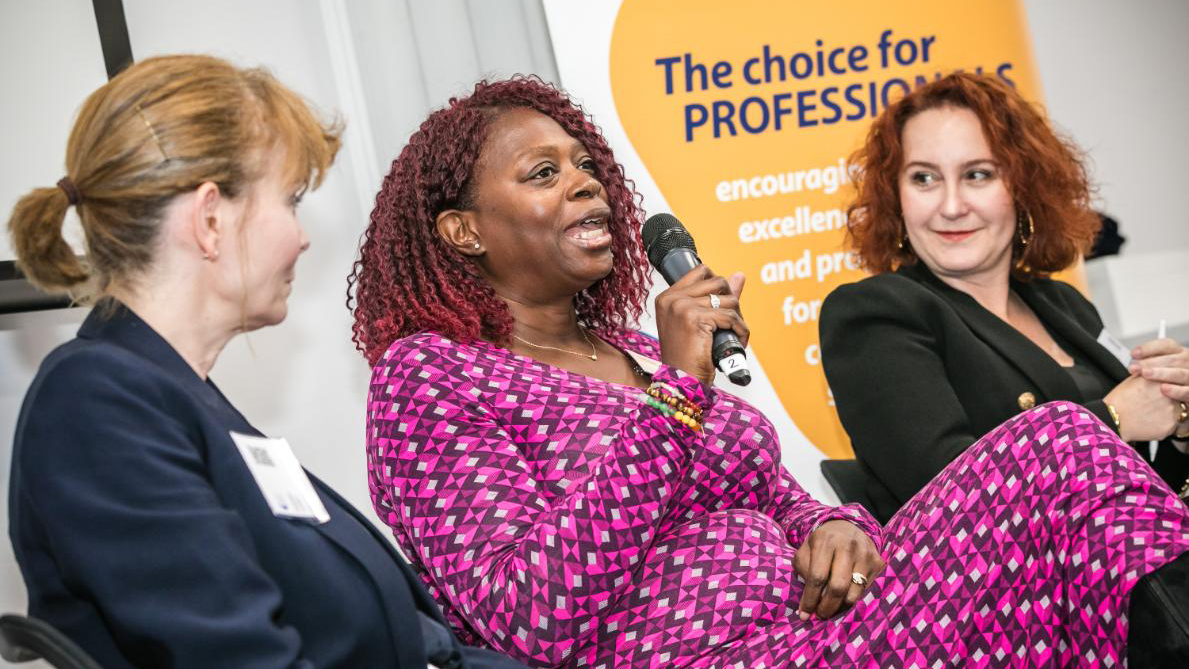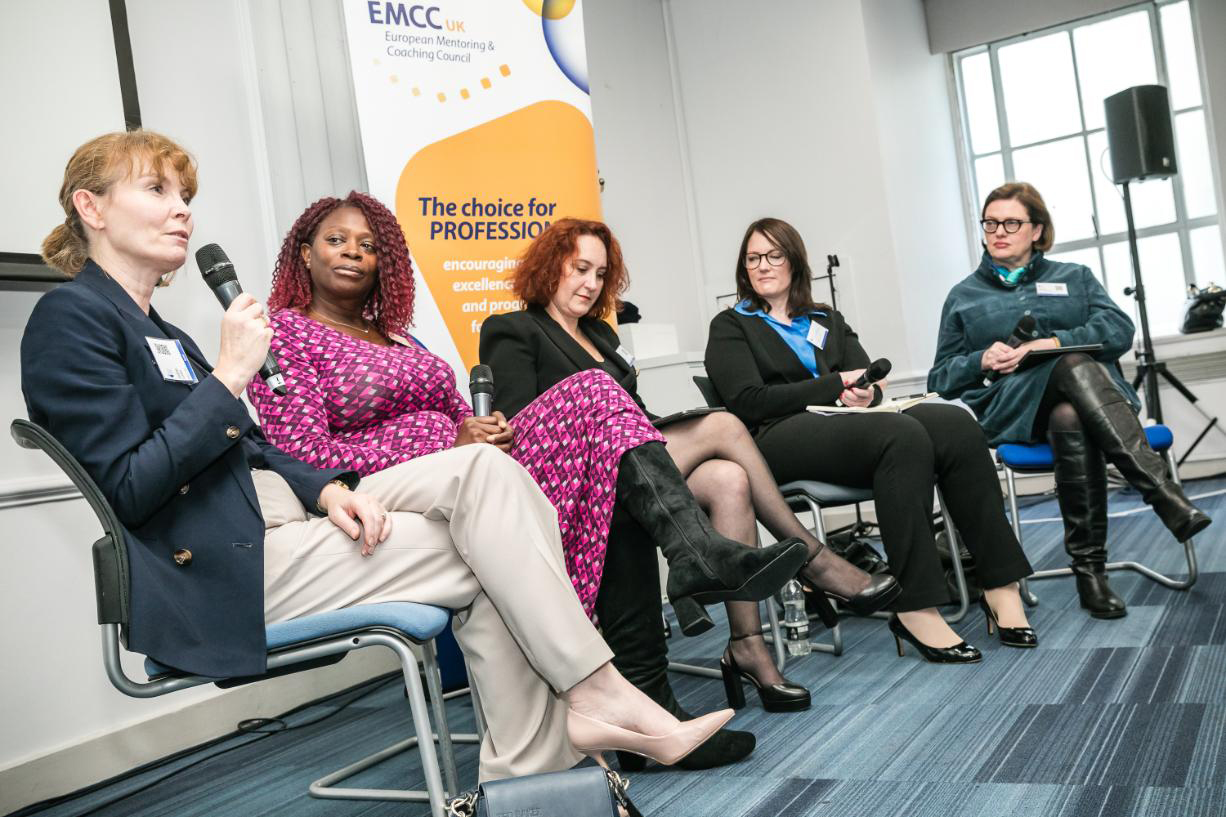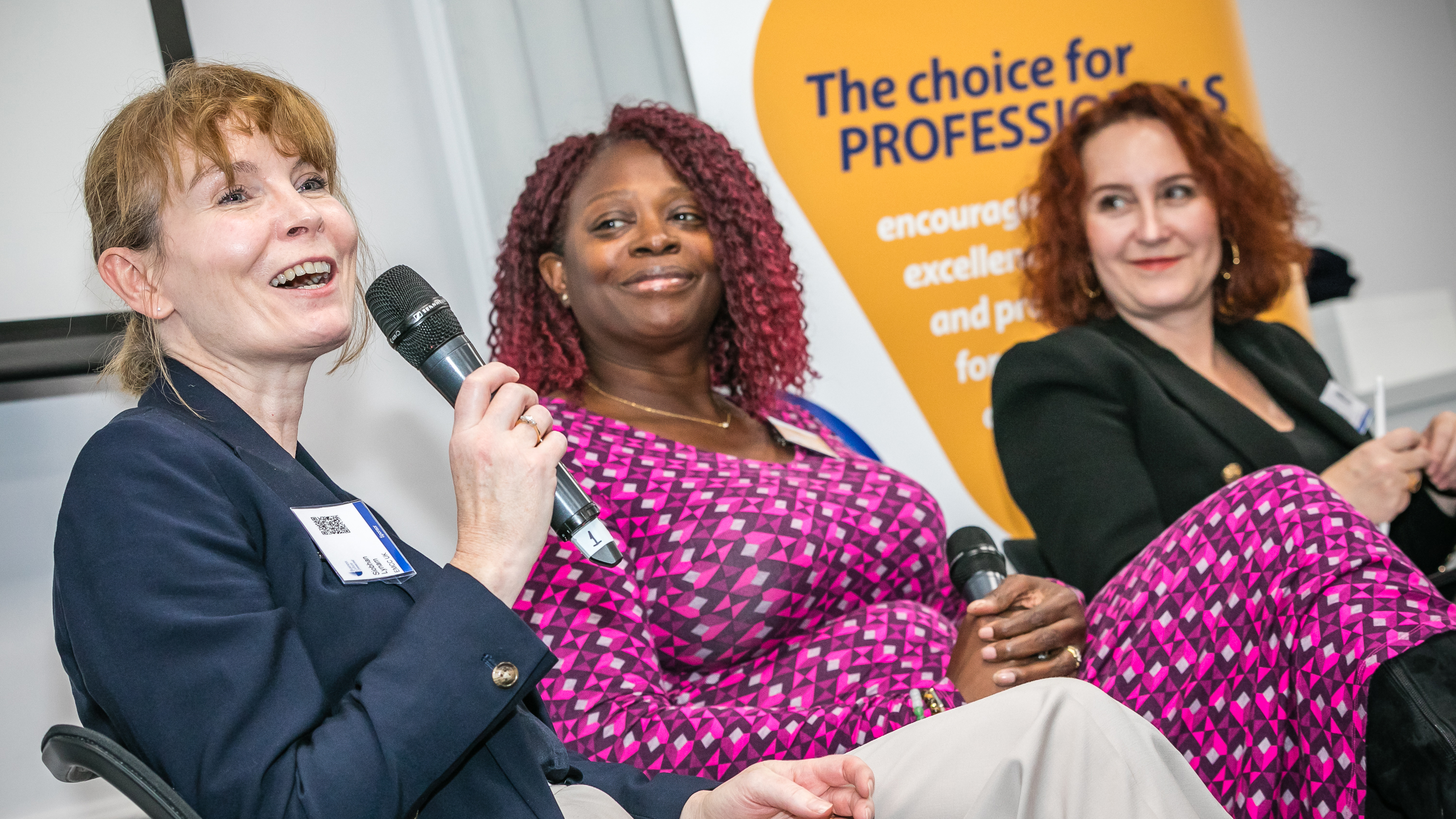
27 November 2023
For the past year, EMCC UK has been engaged in a consultation on equity, diversity and inclusion in coaching and coach training. The themes which have emerged via listening circles were discussed at an interactive panel disussion (seen above) during the recent Business Culture Connected event in London, and are presented here.
The EMCC UK listening circles originated following an EMCC UK Conversations with Authors webinar with Salma Shah, where we discussed her book, Diversity, Inclusion and Belonging in Coaching. Following the webinar, Rachael Hanley-Browne, President of EMCC UK, had a follow-up meeting with both Salma and an attendee, Coretta Hine, who is an equity, diversity and inclusion (EDI) specialist.
Our focus was on how the EMCC UK membership body could better support under-represented and socially excluded groups to access both coaching and coach training. We agreed that our initial approach should start with listening to better understand the barriers and challenges faced by organisations, employees, and potential coaches.
Subsequently, a group of EMCC directorate volunteers, and EDI coaching specialists, hosted two listening circle sessions. These sessions offered an opportunity for individuals who are responsible for offering coaching provision within their organisation to provide their opinions and perspectives on how coaching is delivered within their organisations, with a specific focus on diversity and inclusion.
The hosts were:
EMCC UK President Rachael Hanley-Browne
Hande Yaşargil, EMCC UK Director of Diversity and Inclusion
Siobhan Lynam, EMCC UK Deputy Director of Diversity and Inclusion
Coretta Hine, Founder of Coretta Coaching & Consultancy and EDI advocate
Salma Shah, inclusion and belonging champion and author
One meeting was held online, and the second was in person in London.
In total, 11 contributors took part from a variety of organisations and industries. Their contributions have been anonymised. When we use the term diversity, we are specifically addressing global majority, under-represented and socially excluded groups. We are aware that diversity also includes other protected characteristics. Our future learning circles will address these specific characteristics including neurodiversity.
We also discussed the themes of these initial conversations at the Business Culture Connected event in London on 15 November 2023. Many of the issues addressed were endorsed by the HR and OD participants present. As a result, two organisations have volunteered to support this ongoing consultation in 2024.

Above (left to right): Siobhan Lynam, Coretta Hine, Hande Yaşargil, Jennifer Spalding and Rachael Hanley-Browne at Business Culture Connected 2023.
Summary of themes
Several obstacles face coaches at work in under-represented and socially excluded groups. Seven key themes which emerged during our conversations are:
1. Non-diverse leadership – When organisational leadership is non-diverse, then diverse individuals and their expert knowledge and understanding is missing from the conversation.
2. Neglect of D&I – In some organisations, the focus of coaching for middle management is either remedial, or to produce better productivity. In these conditions, diversity and inclusion is neglected.
3. Lack of opportunity – Under-represented employees are often not given the same opportunities as their privileged colleagues to receive coaching.
4. Missing out – Coaching in organisations is often marketed solely by word of mouth. Because global majority groups are often excluded from informal networking, they miss out on knowing that coaching is available, and that it is invaluable for professional development.
5. Ethnically-matched coaching – In some organisations, there is no knowledge or understanding of the value of ethnically matched coaching, where coach and coachee share a deeper understanding of D&I issues.
6. Capacity issues – Global majority employees often have to out-perform their colleagues at work simply to retain their roles, and therefore may simply feel that they do not have the capacity to coach or be coached.
7. Fear of offence and tokenism – Some organisations struggle to understand how to develop coaching for minoritised groups. Coaching organisers can be hesitant to identify minoritised groups, out of concern for causing offence, or engaging in tokenism.
How are coaches selected?
There remains a hierarchical system of coaching within organisations. C-suite managers, senior leaders and executives are offered leadership sponsored coaching by experienced external coaches. In contrast, middle managers and other employees have little access to coaching, or coaching is provided by less experienced internal coaches.
External coaches are often chosen based on how well they match with the ethos of organisations. Consequentially, there is a tendency for organisations to use commercial coaching companies rather than individual coaches. In addition, it was noted by contributors that most coaches, both internal and external, are white. It was observed that when organisations are offered minority external coaches, individuals tend to choose a white coach. Further evidence for this was provided by contributors who reported that senior leaders often perceive global majority (GM) coaches as ‘not corporate’.
Conversely, ethnically matched coachees feedback that GM coaches provide them with a positive coaching experience. Consequentially, the use of external coaching companies and the perception of GM coaches as alternative reduces the opportunity for diverse coaches to secure contracts in organisations. This in turn reduces the availability of ethnically matched coaching for GM employees.
External coaches are perceived as well trained, and in contrast internal coaches are reported as less experienced and less qualified. Training for internal coaches is inconsistent across institutions. Coaching within some industries is ‘sloppy’ and not valued. There is often poor quality control of coaching. Internal coach training varies from minimal or no training to comprehensive training.
In some organisations, internal coaches are offered CPD, supervision and time to commit to coaching. Some organisations which provide comprehensive training opportunities for internal coaches report that these employees often leave the organisation post training, taking their qualifications elsewhere. However, in other organisations, coach training and processes are not always given the time commitment and support required. Lack of opportunity and affordability of coach training affects the type of person who can become a trained internal coach, and results in a disproportionate number of socially privileged white coaches. (Our understanding of ‘white privilege’ is the unearned comparative social advantages that a white person has on the basis of their race in a white dominated society.)

Above: Siobhan Lynam, Deputy Directory of Diversity and Inclusion, speaking at Business Culture Connected 2023.
Contributors noted that only ‘one out of 16 coaches is not white’, but they believe that individuals put forward for coach training within organisations need to be more diverse. In some organisations, coaches are chosen from a panel of non-diverse internal coaches. There are several explanations for the lack of inclusion within these internal coaching panels. Firstly, the process for training internal coaches is often exclusionary. In some organisations, individuals who wish to become an internal coach need to provide a business case for their suitability, or are chosen based on their enthusiasm for coaching and their ability to commit to the coaching process.
Under-represented individuals are less likely to have had exposure to coaching, therefore reducing their enthusiasm and passion for a process they have not experienced. Also, GM individuals are known to experience comparatively higher workloads. Therefore, a commitment to coaching could worsen this and lessen the likelihood that their managers would sponsor them. All of these these factors might adversely affect diverse individuals’ rate of volunteering for coach training.
The second explanation is the lack of diverse leadership within organisations which creates a self-fulfilling cycle. Non-diverse leadership reduces the availability of experienced, diverse coaches to coach and mentor the next generation of diverse leaders and coaches. Without leadership support, young, diverse individuals are less likely to reach the higher echelons of leadership.
Furthermore, there is little room for mistakes for diverse coaches. It is felt that if an organisation ‘takes a chance on a diversity coach and if it goes wrong, it will never happen again’. An intolerance for errors has long-term consequences that results in reduced opportunities for diverse coaches. Stereotyping and discrimination has also adversely affected some GM contributors. For some there has been an assumption that they are in the coaching space looking to be coached rather than present as an experienced coach. In addition, GM contributors are often the only GM individual ‘in the room’, and their career progression has been adversely affected because they have struggled to gain access to some work and coaching spaces. If diversity coaches are not welcomed in work and coaching spaces, there is reduced opportunities for them to coach others.
It was noted that there is a paucity of senior GM and female leaders within organisations. The consequence is a lack of diverse mentors and a reduced focus on diversity and inclusion in coaching. It was noted that to be an effective diversity aware coach, coaches must be aware of what is happening in the world and the media outside of the room or the organisation. Diverse coaches are more likely to have a heightened awareness of issues affecting diversity groups.
A paucity of diverse coaches has an adverse effect on diversity coachees. Diversity conversations and rapport development is hindered in unmatched coaching dyads. Some contributors also commented that there is ‘no training for coaches to deal with diversity issues’, and that internal coaches need to be comfortable having diversity and inclusion conversations. However, some contributors felt that with experience white coaches do get better at listening and responding to diversity and inclusion issues within coaching conversations – although this is the perception of non-diverse coaches, which may not reflect the perception of diverse coachees.
How is coaching offered to under-represented groups?
In organisations with a strong coaching culture, coaching is advocated by senior leaders. However, in some organisations there is little support for or marketing of coaching. Within several organisations there is a perception of coaching as reserved for non-diverse leaders, or it is seen as remedial. When coaching is felt to be either the preserve of white privileged men, or it is called upon only when individuals are failing, this adversely affects individuals’ desire to engage with or to understand the value of coaching.
If coaching is exclusively designed by and for one group, it will invariably not function to adequately support other groups. Consequently, as reported by contributors, there is little focus from some senior leaders on diversity issues in coaching. The coaching focus is instead on industry results. Some organisations have developed special coaching programs for females and other diversity groups. However, contributors report that there is poor uptake for some of these programs. This may reflect a lack of engagement with diversity groups in the design of these programs.
There is a strong desire among contributors to improve diversity and inclusion within their organisation through coaching. However, within some organisations, the value and marketing of coaching is not reaching diversity groups. One hinderance is the struggle to discuss coaching opportunities with diversity employees. For white individuals, there is ‘nervousness around identifying minoritised individuals for coaching’. The difficulties in identifying minoritised groups for coaching is based on a fear of how coaching organisers would be perceived, a concern around saying the wrong thing and causing offence, and a desire to avoid tokenism. The concerns are therefore the anxieties of white individuals and how they may be perceived. Consequentially the focus is not on diverse individuals.
In addition, some contributors have little knowledge about whether under-represented groups are requesting coaching within their organisation, and whether they prefer diversity-matched coaching or not. It is therefore imperative that there is diversity of representation within groups who are responsible for arranging and promoting coaching. To overcome the barriers to accessing coaching, all groups need to have an opportunity to voice their perceptions and experiences.
The promotion of coaching opportunities within organisations is often by word of mouth. However, minoritized individuals often have reduced access to informal networks and word of mouth information. Coaching opportunities need to be appropriately designed with input from all potential users, clearly defined, and transparently and equitably promoted.
What actions do organisations need to take from a EDI perspective?
Those responsible for developing coaching provision within organisations illustrate a real appetite for change. However, the pace of change is slow and there are some hurdles that need to be overcome. Organisations should have a public commitment to improved diversity of coaches and improved access to coaching for all. To do so requires affirmative action and adequate planning. Policy changes in isolation are not adequate without action. Organisations need to empower diversity coaches and coaching service users. This requires that diverse individuals are involved in coach selection, promotion of coaching services, and the design of coaching offers.
In tandem, support needs to be provided for white privileged leaders to engage in self-reflection on their privilege and bias, and their subsequent effect on the opportunities of diverse individuals within their organisations. Without adequate self-reflection, privileged leaders can struggle to sufficiently support diversity in coaching provision within their organisations.
To challenge the existing culture within organisations and improve the progression of diverse individuals, it is imperative that coaching is offered in an equitable manner. Equity requires that a diversity of coaches are available for individual employees of all grades. In addition, there is a need for improved training to handle diversity issues in coaching. For coachees to feel comfortable in raising diversity issues, coaches need to learn how to sensitively handle and be open to these topics, and to understand and express their limitations and lack of experience of identities beyond their own. This training needs to include those who organise coaching provision to enable them to have much needed difficult conversations around coaching provision.
How can EMCC UK support individuals who are responsible for coaching provision within organisations?
Contributors requested opportunities for continuous professional development and access to supervision from EMCC UK. They suggested that video demonstrations and podcasts would also be helpful. Contributors would like the opportunity for trainees and internal coaches to be observed by a skilled coaching professional. This would allow for feedback and learning on coaching techniques. Contributors would also like to see improved training in coaching skills and full accreditation of internal coaches, but recognise that affordability is an issue.
We presented the findings of these initial conversations at the Business Culture Connected event in London on 15 November, and many of the issues addressed were endorsed by the participants. We have had two organisations volunteer to support this work in 2024.
What can EMCC UK do to promote EDI in organisational coaching provision?
EMCC UK can promote EDI in organisational coaching provision by proactively ensuring that under-represented groups are given opportunities to share their experiences and knowledge with EMCC individual and organisational members. For example, ensuring that our newsletters, blogs, podcasts, social media activity and website is representative of the whole coaching profession and by highlighting under-represented role models. The coaching space needs more role models such as Salma Shah and Coretta Hine.
In addition, EMCC UK can aim to ensure that coach supervisors are versed in EDI issues and understand the systemic nature of exclusion, so that they can in turn raise this awareness with the coaches they support.
EMCC can also ardently call on coach training and education providers to ensure that their programmes adequately address EDI practices. EMCC UK published an open letter about this matter to training, education and qualification providers in coaching, mentoring and supervision in 2022. EMCC UK also aims to signpost learning resources for coaches to continue their own education. For example, the EMCC UK website has a library of suitable EDI resources in its Diversity and inclusion resource hub.
EMCC UK aims to build EDI into our accreditation processes. This is an ongoing process and there is current progressive dialogue taking place within the EMCC Global. Globally there have been some innovative initiatives, including coaching accreditation through storytelling in the Pacific Region. EMCC UK is affiliated with EMCC Global, which has a published D&I policy.
The way forward
EMCC UK will continue to build on the listening circles initiative and to promote ongoing dialogue with organisations. We welcome and encourage organisations to put themselves forward to talk to us about their experiences of the themes discussed here, and the actions readers have taken to tackle some of these issues.
These conversations themselves assist in raising awareness and reflection on current practices and the often unintended consequences of these practices. EMCC UK will continue to offer support and encouragement to our organisational members to move the EDI agenda forward. We will support and share current research and knowledge about EDI in the coaching space to bring evidence-based and ethical practice to the fore.
We welcome your thoughts and feedback on this work, and if you would like to contribute, please get in touch with either Hande Yaşargil or Siobhan Lynam below:
[email protected]
[email protected]